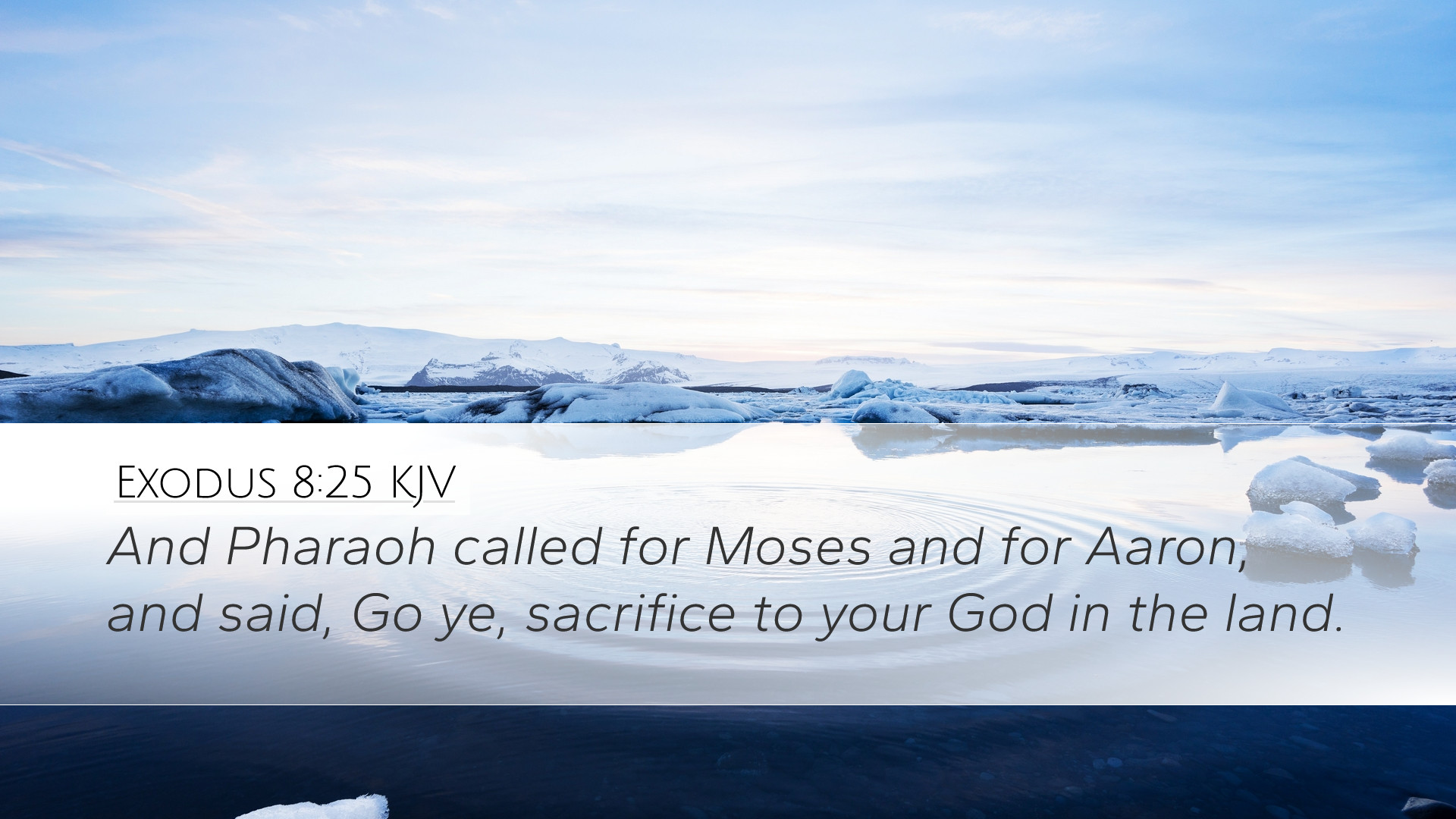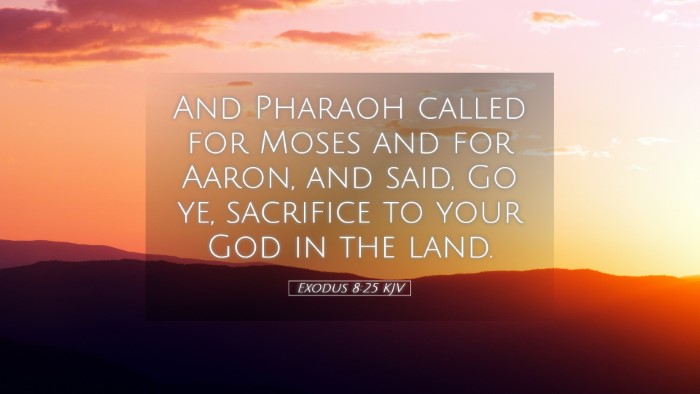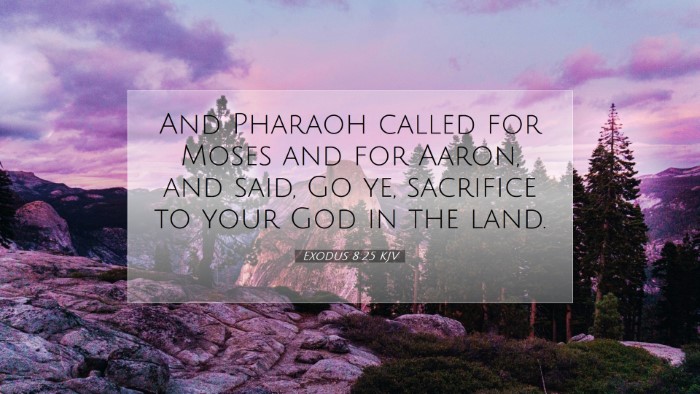Exodus 8:25 - Commentary Summary
Exodus 8:25 states, "And Pharaoh called for Moses and Aaron, and said, Go ye, sacrifice to your God in the land." This verse occurs during a significant moment in the narrative of the plagues of Egypt. Various public domain commentaries provide profound insights into the implications, theological themes, and practical applications of this text.
Contextual Background
This passage is set during the second plague, which involved swarms of flies. Pharaoh's hardened heart stands in stark contrast to the power of God being manifest through Moses and Aaron. As we explore this verse, it is essential to reflect on the historical and cultural significance of Pharaoh’s proclamation and the underlying motives that drive his conversations with Moses.
Pharaoh’s Compromise
Matthew Henry notes that Pharaoh’s offer to let the Israelites sacrifice in the land showcases a focus on compromise rather than obedience. This sentiment reflects humanity's tendency to seek convenient solutions that appease divine demand without yielding heartily to God’s call. This half-measure is significant as it displays the character of Pharaoh: resistant, self-serving, and unwilling to submit entirely to the order of God.
Theological Implications
Albert Barnes expands on the idea of Pharaoh's compromise as both an open challenge to God and a strategic maneuver to prevent the Israelites from leaving Egypt. Theologically, this highlights a recurring motif throughout Scripture: human attempts to negotiate with God in self-interest versus complete obedience to His will. Pharaoh's plan to confine worship within the boundaries of Egypt illustrates a key tension between divine intent and human rebellion.
The Nature of True Worship
Adam Clarke provides insight into what constitutes genuine worship. In his view, true worship requires not only the act of sacrifice but also the complete separation from sin and idolatry associated with a fallen world. Pharaoh's proposal to worship within Egypt signifies an attempt to appropriate divine acts while remaining in a state of defilement, contrasting the biblical call for holiness and separation.
God’s Sovereignty and Human Response
This verse serves as a profound backdrop to reflect on God’s sovereignty and the human response to divine authority. It invites the reader to consider how often people, like Pharaoh, negotiate with God from a place of fear or desperation rather than surrendering openly to His will.
Divine Intervention and Human Resistance
Henry emphasizes God's patience in the progression of plagues as a testament to His desire for Pharaoh to repent. The various responses of Pharaoh display a pattern of hardening his heart, which resonates with the New Testament themes of hardened hearts leading to ultimate judgment. The reader is thus prompted to assess their own hearts and the ways in which they might resist God's call.
Lessons for Modern Believers
For pastors and theologians, this passage serves as a reminder of the dangers of making compromises in one's faith life. Serious contemplation about true worship and obedience can lead to a life characterized by genuine devotion to God. Believers are encouraged to avoid Pharaoh-like tendencies and embrace a fully surrendered life instead.
Understanding the Heart of Pharaoh
A critical examination of Pharaoh’s character reveals a man plagued by fear of the consequences of his disobedience rather than an authentic desire to seek the Lord. Clarke points out that the dialogues between Pharaoh and Moses often demonstrate a self-serving rhetoric aimed at controlling the narrative rather than yielding to God’s authority.
Pharaoh's Dilemma
Barnes reiterates that Pharaoh wanted to minimize the impact of Israel’s exodus plans on Egypt while assuring his own position of power and control. This internal conflict is significant as it mirrors struggles faced by individuals today who grapple with surrendering to God while weighed down by worldly considerations.
God's Call to Full Liberation
The call to sacrifice "in the land" can also symbolize the limited vision that humans often have regarding God's purposes. Full liberation does not lie within the constraints of the fallen world, and believers are reminded that true sacrifice can only occur in full obedience to God’s will. Henry alludes to this by emphasizing the importance of taking a definitive stand against sin as a form of empty worship.
Conclusion: The Challenge of Whole-hearted Worship
In summary, Exodus 8:25 challenges believers to evaluate their understanding of worship, obedience, and the danger of compromising with sin. It aligns with the overarching biblical narrative of God’s pursuit of His people and the necessary response of the believer: to embrace complete surrender rather than negotiate terms with the Almighty.
As history unfolds from this text, the importance of heeding divine instruction and moving towards true worship emerges clearly. This serves as an exhortation for all believers to seek God's will earnestly and respond without reservation.


